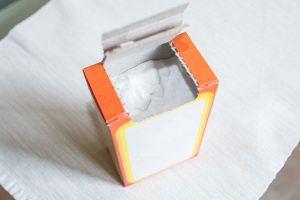Does Baking Soda Kill Bed Bugs?
It’s believed that baking soda dehydrates bed bugs, eventually causing them to die. But does this actually work? Not really. Can baking soda kill bed bugs? Yes, it may kill a small number of individual bed bugs, but if you want to get rid of bed bugs fast with baking soda, the truth is, it’s just not possible.
Bed bugs are highly resilient and extremely good at hiding – they can be very difficult or nearly impossible to eliminate on your own – with baking soda or other home treatments.

How Do You Kill Bed Bugs with Baking Soda?
As we said, baking soda is not an effective way to eliminate bed bugs. However, it can be used as part of an effective treatment against other pests like fleas. Baking soda breaks down when it contacts water, absorbing any moisture, which causes pests to dehydrate. It works on fleas because it happens quickly. How long does it take for baking soda to kill bed bugs? Much longer.
If you do decide to attempt DIY pest control with baking soda, here is the right way to do it:
- Sprinkle baking soda around the areas that fleas, bed bugs, or other pests typically inhabit, such as the mattress and the area around your bed.
- A few days later, vacuum it up and repeat the process.
- Although this may work occasionally, it is not guaranteed to get rid of any pest entirely.
Ready for a Pest Control Quote?
Click the button below to leave your information and we'll be in touch with a free quote!
Are There Any Other DIY Treatments for Bed Bugs?
While at-home treatments for bed bugs should be approached with caution, as they may not be as effective as professional pest control methods, some individuals may want to explore additional options. Here are a few at-home treatments that people have tried:
- Diatomaceous Earth (DE): DE is a fine powder that consists of the fossilized remains of diatoms, which are tiny aquatic organisms. It is believed to be effective against bed bugs by absorbing their protective waxy layer, causing them to dehydrate. Be cautious when using DE, as inhaling the dust can be harmful.
- Rubbing Alcohol: Rubbing alcohol (isopropyl alcohol) is sometimes used as a contact spray for bed bugs. It can kill them on contact, but it evaporates quickly, and it may not reach hidden bugs or eggs.
- Essential Oils: Certain essential oils, such as tea tree oil, lavender oil, and peppermint oil, are thought to have repellent properties. However, their effectiveness in eradicating bed bugs is limited, and they are more commonly used for prevention.
- Hot Steam: High-temperature steam can be used to kill on contact, penetrating cracks and crevices where bed bugs hide.
- Vacuuming: Regular vacuuming can help manage bed bug populations by removing bugs, eggs, and shed skin. Be sure to dispose of the vacuum bag or empty the canister promptly.
- Washer and Dryer: High temperatures are very effective at killing bed bugs. Your washer and dryer’s hot settings can both be used to remove bed bugs from anything that fits inside.
Nothing Beats Professional Bed Bug Control
While baking soda might have its place in various household applications, Terminix Anderson encourages homeowners to opt for proven methods when it comes to bed bug control. Our experienced professionals are dedicated to delivering comprehensive, effective solutions tailored to your unique situation.
Don’t let bed bugs disrupt your peace of mind—call us today for a free quote.


